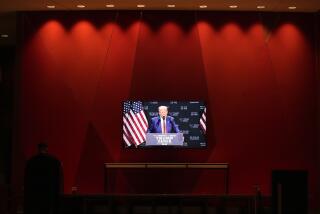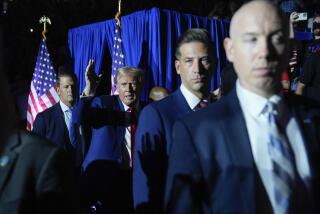Analysis: As violence cuts into GOP convention, Trump under pressure to stay on safety message
- Share via
Reporting from Cleveland — The day before Republicans were to open a convention meant to serve as a fresh opportunity to redefine Donald Trump, organizers had to delay their long-awaited preview of the gathering so as not to collide with President Obama’s remarks to the nation about yet another shocking act of violence.
This time it was in Baton Rouge, La., where three police officers were shot dead Sunday morning. When the GOP briefing began, the first topic was Baton Rouge.
Across Cleveland, worries about violence led the head of the local police union to ask Ohio Gov. John Kasich to rescind the right of gun owners to openly carry weapons near the convention areas. Kasich said that under state law, he did not have the power to limit firearms, which were in evidence Sunday.
Convention organizers, who had hoped to use the afternoon briefing to strike an optimistic tone, were forced to reassure attendees Sunday that the area outside the convention arena — inside is the one place guns will not be allowed — would be safe.
Ohio has held several high-profile events under the so-called open carry law, convention Chief Executive Jeff Larson said, “without any issues.”
“There’s going to be plenty of law enforcement in downtown Cleveland,” he said. “I think it’s going to be fine.”
The events put a fresh focus on the imperative pressing on Trump in coming days: to convince Americans that he can keep them safe, both domestically and abroad.
That is a notion he has pushed repeatedly. But more often than not, his detours into other subjects have diluted his message.
Trump campaign manager Paul Manafort indicated Sunday that he sees the convention as an unalloyed opportunity for Trump on that score. The convention’s first night, he said, will be focused on how to “make America safe again.”
Whether the convention accomplishes that goal rests on two things that are uncontrollable by Manafort or event organizers: an outbreak of violence here or elsewhere, and Donald Trump.
Under some circumstances, Trump could benefit from the environment of violence this year. Candidates who portray themselves as the “law and order” alternative have succeeded before; unrest has, if anything, amplified the message of candidates like Richard Nixon, who benefited from protests at his 1968 convention.
But Trump himself has been accused this year of fomenting violence with remarks aimed at protesters inside his events, so he could be seen in some quarters as lacking real concern for outbreaks. That possibility is magnified by his reactions to charged events, which have sometimes been layered with insouciance rather than sobriety.
Trump dealt with Sunday’s Baton Rouge news on Twitter, his favorite communications vehicle.
“President Obama just had a news conference, but he doesn’t have a clue,” he wrote. “Our country is a divided crime scene, and it will only get worse.”
Minutes earlier, he alluded to his regular campaign assertions that only he can bring the required toughness to bear in the White House.
“Our country is totally divided and our enemies are watching,” he said. “We are not looking good, we are not looking smart, we are not looking tough!”
As is typical, Trump offered no details about what should be done. Further, his approach touched on one of the elements which has complicated his campaign: His personality and self-focus can get in the way of his message.
Trump demonstrated that at one of the highest-profile events of the general election campaign, the unveiling Saturday of his running mate, Indiana Gov. Mike Pence.
Typically, the presumptive nominee’s introduction speech plays heavily on the overarching goals and desires of the ticket, the feats the chosen person has accomplished, and how the choice expands the party’s reach into the electorate.
Not Trump’s.
His speech drove repeatedly into rhetorical cul-de-sacs that had one thing in common: They were about him.
He spoke of the campaign he had waged and how definitively he had defeated adversaries. He went on at length about Hillary Clinton’s State Department emails, asserting that she had committed crimes for which she would be punished in November.
He went on a long soliloquy about the Johnson Amendment, which bans churches from political activity. He talked about his opposition to the North American Free Trade Agreement and the Iraq war, both of which were supported by his new running mate, Pence.
Worse, he stood in front of the podium alone, with Pence offstage as if to telegraph that the campaign was still, regardless of his new partner, all about Trump.
The problem wasn’t Pence’s feelings — vice presidential candidates quickly get used to serving at the whim of the nominee.
The problem was that Trump didn’t cast any of his remarks in the context of American voters. There was no outline of what this new ticket would mean for the lives of the people who will decide the presidency.
American voters prefer their candidates to care about them, not themselves. President Obama, in 2012, trailed his opponent, Republican Mitt Romney, when it came to several qualities important to voters. Exit polls found that voters thought Romney had a better vision, shared their values and was a strong leader.
Obama, however, overwhelmed Romney by a 4-1 margin when it came to which candidate was seen by voters as caring more about them. His victory showed the importance of that attribute.
Trump now trails Clinton on that count — by 10 points in a recent McClatchy/Marist poll.
It’s not that Trump is unable to put himself in the place of voters and see the election options from their perspective.
In June, in his first focused speech on Clinton, he directly took on the Democrat’s campaign slogan of “I’m with her.”
“You know what my response is to that? I’m with you,” Trump said.
That message held promise — but it has been repeated only sparingly since then.
Much as Trump won’t stop repeating falsehoods that make him look good — he didn’t oppose the Iraq war initially, for example, even though he says he did — he also makes clear that his comfort zone is talking about himself and his accomplishments, not anyone else.
At the very least, he is now under increased pressure to make the election less about his desire to quash Hillary Clinton and more about whether he can make Americans feel safe in the process.
Twitter: @cathleendecker
ALSO:
In a time of tumult, Trump and Clinton compete to be seen as the best leader
Once again, President Obama tries to persuade America it is united
Will the violence across America change the presidential campaign?
Updates on California politics
Live coverage from the campaign trail
More to Read
Get the L.A. Times Politics newsletter
Deeply reported insights into legislation, politics and policy from Sacramento, Washington and beyond. In your inbox twice per week.
You may occasionally receive promotional content from the Los Angeles Times.











